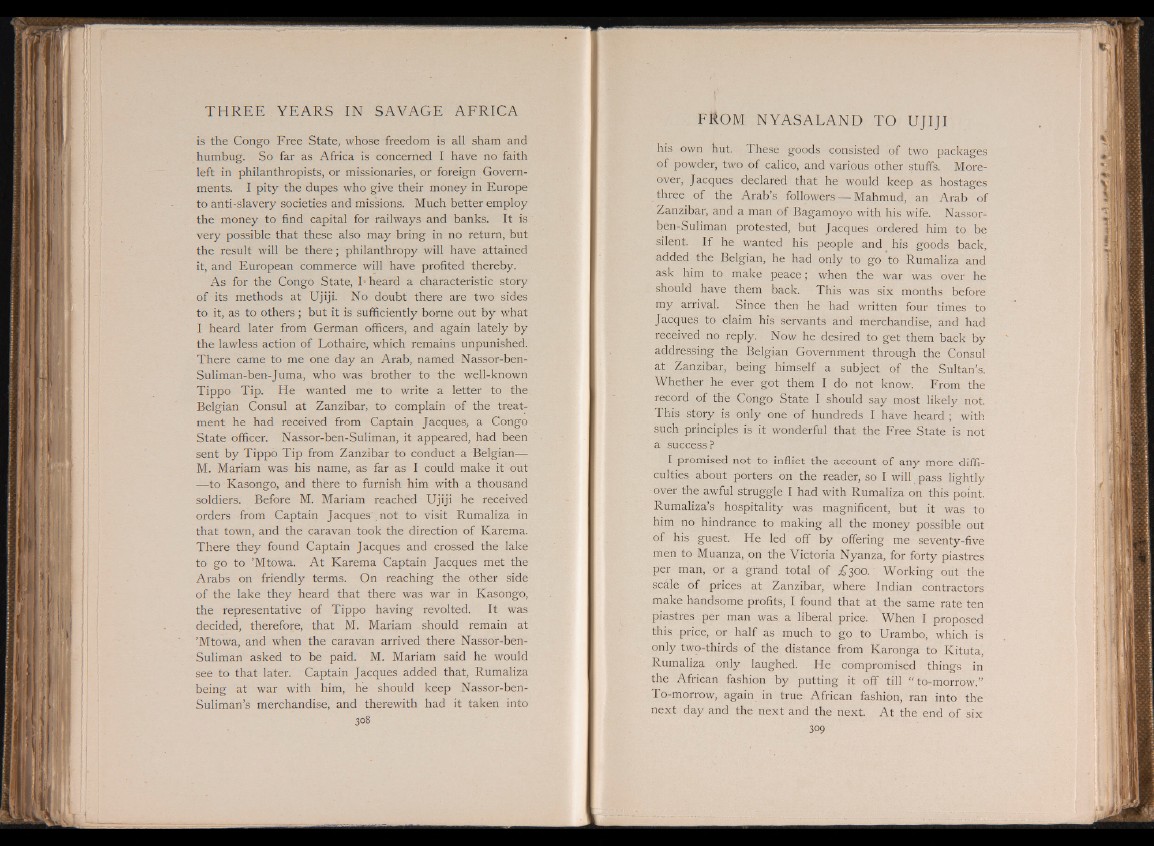
is the Congo Free State, whose freedom is all sham and
humbug. So far as Africa is concerned I have no faith
left in philanthropists, or missionaries, or foreign Governments.
I pity the dupes who give their money in Europe
to anti-slavery societies and missions. Much better employ
the money to find capital for railways and banks. It is
very possible that these also may bring in no return, but
the result will be there; philanthropy will have attained
it, and European commerce will have profited thereby.
As for the Congo State, I* heard a characteristic story
of its methods at Ujiji. No doubt there are two sides
to it, as to others; but it is sufficiently borne out by what
I heard later from German officers, and again lately by
the lawless action of Lothaire, which remains unpunished.
There came to me one day an Arab, named Nassor-ben-
Suliman-ben-Juma, who was brother to the well-known
Tippo Tip. He wanted me to write a letter to the
Belgian Consul at Zanzibar, to complain of the treatment
he had received from Captain Jacques, a Congo
State officer. Nassor-ben-Suliman, it appeared, had been
sent by Tippo Tip from Zanzibar to conduct a Belgian—
M. Mariam was his name, as far as I could make it out
—to Kasongo, and there to furnish him with a thousand
soldiers. Before M. Mariam reached Ujiji he received
orders from Captain Jacques , not to visit Rumaliza in
that town, and the caravan took the direction of Karema.
There they found Captain Jacques and crossed the lake
to go to ’Mtowa. At Karema Captain Jacques met the
Arabs on friendly terms. On reaching the other side
of the lake they heard that there was war in Kasongo,
the representative of Tippo having revolted. It was
decided, therefore, that M. Mariam should remain at
’Mtowa, and when the caravan arrived there Nassor-ben-
Suliman asked to be paid. M. Mariam said he would
see to that later. Captain Jacques added that, Rumaliza
being at war with him, he should keep Nassor-ben-
Suliman’s merchandise, and therewith had it taken into
308
his own hut. These goods consisted of two packages
of powder, two of calico, and various other stuffs. More-
over, Jacques declared that he would keep as hostages
three of the Arab’s followers — Mahmud, an Arab of
Zanzibar, and a man of Bagamoyo with his wife. Nassor-
ben-Suliman protested, but Jacques ordered him to be
silent. If he wanted his people and his goods back,
added the Belgian, he had only to go to Rumaliza and
ask him to make peace; when the war was over he
should have them back. This was six months before
my arrival. Since then he had written four times to
Jacques to claim his servants and merchandise, and had
received no reply. Now he desired to get them back by
addressing the Belgian Government through the Consul
at Zanzibar, being himself a subject of the Sultan’s.
Whether he ever got them I do not know. From the
record of the Congo State I should say most likely not.
This story is only one of hundreds I have heard ; with
such principles is it wonderful that the Free State is not
a success ?
I promised not to inflict the account of any more difficulties
about porters on the reader, so I will pass lightly
over the awful struggle I had with Rumaliza on this point.
Rumaliza’s hospitality was magnificent, but it was to
him no hindrance to making all the money possible out
of his guest. He led off by offering me seventy-five
men to Muanza, on the Victoria Nyanza, for forty piastres
per man, or a grand total of £300. Working out the
scale of prices at Zanzibar, where Indian contractors
make handsome profits, I found that at the same rate ten
piastres per man was a liberal price. When I proposed
this price, or half as much to go to Urambo, which is
only two-thirds of the distance from Karonga to Kituta,
Rumaliza only laughed. He compromised things in
the African fashion by putting it off till “ to-morrow.”
To-morrow, again in true African fashion, ran into the
next day and the next and the next. At the end of six
309